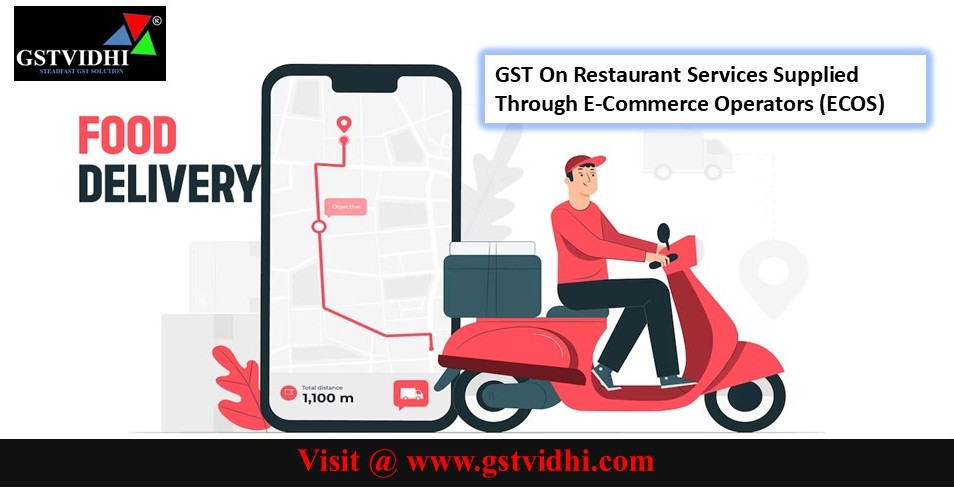
GST On Restaurant Services Supplied Through E-Commerce Operators
(ECOS)
“When you order from Swiggy, who pays the GST – the dhaba or the
app?” Let’s find out.
Introduction:
Who Are E-Commerce Operators (ECOs)?
In the digital age, food
is just a few clicks away. Platforms like Swiggy, Zomato, Uber Eats have
become household names. These are called E-Commerce Operators (ECOs)
under GST — platforms that facilitate the supply of goods or services (in this
case, food) between a supplier (restaurant) and a customer (you).
Earlier, the restaurant
supplying the food was responsible for charging and paying GST. But this
changed on 1st January 2022 — and the liability shifted to the ECOs
themselves.
Let’s break down what
changed and what it means for businesses and consumers alike.
The Legal
Shift: Notification & Section 9(5)
As per Section 9(5)
of the CGST Act, 2017, the Government may notify certain services where the
ECO, instead of the actual supplier, is liable to pay GST.
Based on the
recommendations of the 45th GST Council Meeting (held on 17th September
2021), the government issued Notification No. 17/2021-Central Tax (Rate)
dated 18.11.2021, which included:
“Restaurant services
(other than those provided by restaurants located in hotels having a declared
tariff above ₹7,500)” under Section 9(5).
That means: From 01.01.2022,
Zomato or Swiggy — not the restaurant — has to pay GST on the food
orders delivered through their platforms.
Detailed
Clarification: CBIC Circular No. 167/23/2021-GST
To clarify how this shift
would work in practice, the CBIC issued Circular No. 167/23/2021-GST
dated 17th December 2021. Here's what it said:
1. No TCS on Restaurant
Services
ECOs were earlier
required to collect Tax Collected at Source (TCS) under Section 52. Now,
for restaurant services (under 9(5)), TCS is not required. However, for
other supplies (like grocery), TCS continues as before.
2. No New Registration
Required for ECOs
If an ECO is already
registered under GST, no separate registration is needed for paying tax
on restaurant services under Section 9(5).
3. Even Unregistered
Restaurants Covered
Even if the restaurant is
not registered under GST, the ECO still needs to pay tax on the food
supplied through its platform.
4. Restaurant's Turnover
Includes ECO Sales
The sales made by a
restaurant through an ECO will be included in its aggregate turnover,
even if the ECO pays GST on it.
5. No Reverse Charge
Entry in GSTR-3B
The ECO is not
considered the recipient of the restaurant service. Hence, it should not
show it as inward supply under reverse charge in GSTR-3B.
6. No ITC Reversal
Required by ECO
ECOs can continue to
claim ITC on their own platform-related inputs like rent, tech, etc. But
— they cannot use that ITC to pay GST on restaurant services. That tax
must be paid in cash.
7. Mandatory Cash Payment
of GST on Food
GST on restaurant
services supplied through ECO must be paid in cash only by the ECO. No
input tax credit (ITC) can be utilized for this purpose.
8. Mixed Orders Must Be
Billed Separately
If an order includes both
food and non-food items (like packaged drinks), ECO must issue separate
invoices:
- One for restaurant services (ECO pays
GST)
- One for other items (restaurant pays
GST)
9. Who Issues the
Invoice?
The ECO will issue the
invoice to the customer for the restaurant service, not the restaurant.
10. How to Report in
Returns?
- ECO reports
restaurant services in GSTR-3B (outward taxable supplies)
and GSTR-1 in Table 7A(1) or Table 4A.
- Restaurants
must also report these sales for turnover purposes in
GSTR-1 (Table 8) and GSTR-3B (Table 3.1(c)), even though
they aren’t liable to pay tax.
Illustration:
Order from a Dhaba via Zomato
Order Amount:
₹500
Restaurant:
“Desi Dhaba”
Platform:
Zomato
|
Particular
|
Before
1 Jan 2022
|
After
1 Jan 2022
|
|
GST
Charged By
|
Desi
Dhaba
|
Zomato
|
|
GST
Rate
|
5%
(No ITC)
|
5%
(No ITC)
|
|
Who
Paid Tax?
|
Restaurant
|
Zomato
|
|
Invoice
From
|
Restaurant
|
Zomato
|
|
Return
Filing
|
By
Restaurant
|
Restaurant
+ Zomato
|
Exceptions
– What’s NOT Covered?
The shift under Section
9(5) does not apply to:
1. Restaurants
in luxury hotels (tariff > ₹7,500)
2. Dine-in
or takeaway orders not routed through ECOs
3. Any
non-restaurant items sold through ECOs (like groceries)
Conclusion:
The GST Council’s move to
shift tax liability on restaurant services (excluding specified premises)
supplied through ECOs from restaurants to the ECOs under Section 9(5) is a major
compliance and tax administration shift. It simplifies GST for small
restaurants but also brings added responsibility on platforms like
Swiggy and Zomato.
Taxpayers involved in
such supplies – whether ECOs or restaurants – must carefully follow invoice,
registration, payment, and return protocols to avoid penalties or audit
risks.
Disclaimer: All the Information is based on the notification, circular advisory and order issued by the Govt. authority and judgement delivered by the court or the authority information is strictly for educational purposes and on the basis of our best understanding of laws & not binding on anyone.
Click here